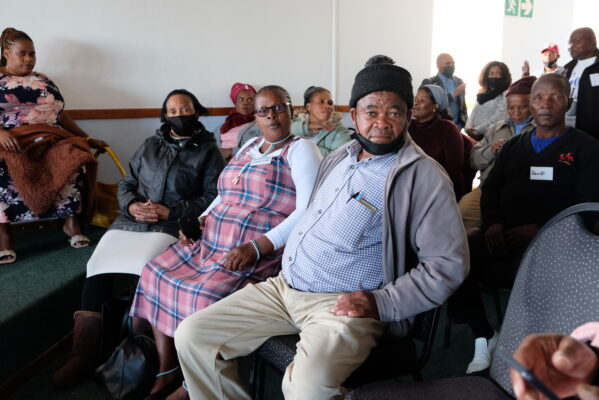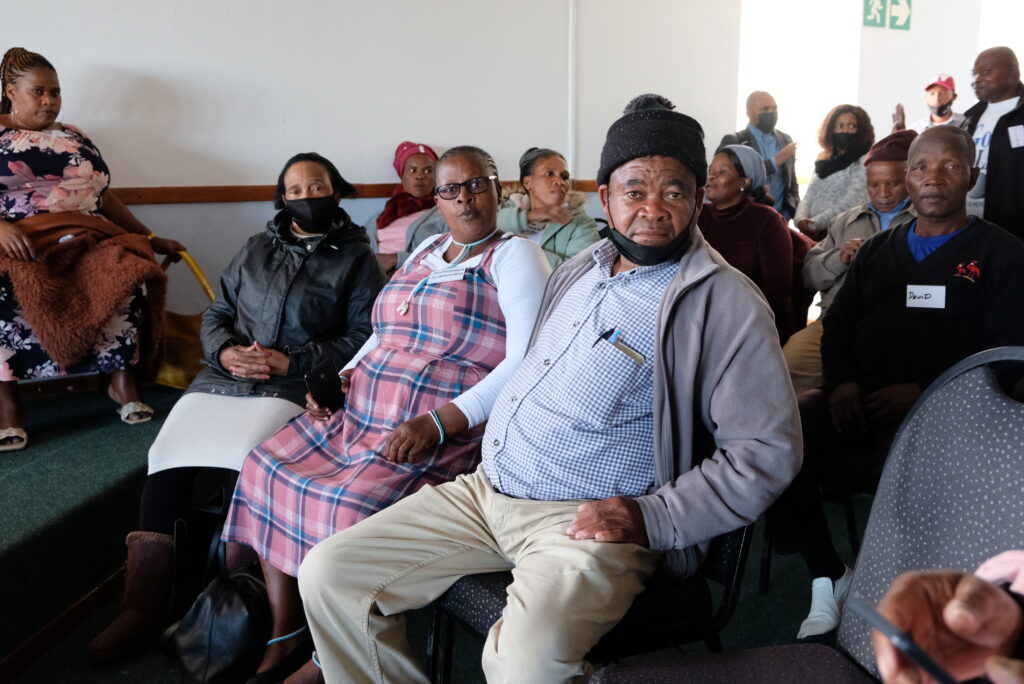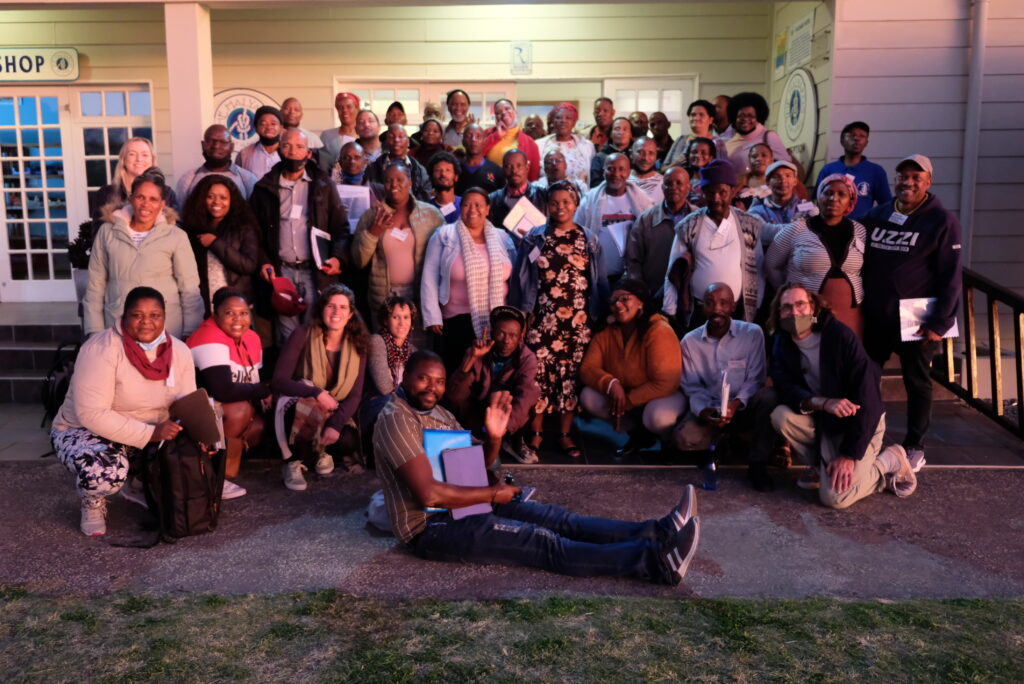Deepening Partnerships with SMALL-SCALE FISHERS in Eastern Cape, South Africa

This blog post reflects on the deeper partnership between One Ocean Hub researchers in South Africa, small-scale fishing cooperatives in the Eastern Cape and other partners, including local legal-aid NGOs that have become new Hub partners, on a series of challenges related to the recognition, respect and realization of small-scale fishers’ fishing and human rights. The post summarizes the key topics and approaches co-developed over two workshops to address continuing and new challenges for small-scale fishers and explore the different ways in which research can make a meaningful contribution. The post will provide a short background on the situation of the recognition of small-scale fishers rights in South Africa, share the evolving conversation on the priorities for small-scale fishers in the Eastern Cape with Hub researchers, and conclude with key messages from small-scale fishers to the ocean, decision-makers and large-scale companies.
Recognition of small-scale fishers’ rights in South Africa
In November 2019 and March 2020, to great fanfare and media coverage, South Africa’s Department of Forestry, Fisheries and Environment granted small-scale fishing (SSF) rights to 72 SSF co-operatives in the Eastern Cape province of South Africa. This was widely celebrated as a long overdue milestone in the struggle for rights and recognition by small-scale and subsistence fishers in the province. However, this process was understood to be just the beginning of a journey, with a lot of expectation built regarding the kinds of support (financial investment, equipment, training and so on) that these newly formed co-ops would receive from the government to enable their transition from having rights on paper to utilising their rights in practice. However, none of this has come to fruition – from COVID19, to shrunken government budgets, to explicitly broken promises, the small-scale fishers have, for the most part, been left to figure things out on their own. They have had to navigate the extremely confusing and onerous processes of applying for their permits, setting up their co-operatives’ management structures, responding to a complex range of compliance requirements, negotiating contracts with private companies intent on keeping small-scale fishers on the margins, fighting for access to and protection of the ocean, and trying to keep their members out of poverty.
Our research has documented that small-scale fishers are often undermined and disrespected by the authorities, and others in positions of power, who put their struggles to make a success of their co-operatives down to ‘lack of capacity’ or being ‘unskilled’. Our research has been demonstrating that this is a profoundly unfair and oversimplified judgement. Small-scale fishers are deeply knowledgeable about the ocean and about the work they have carried out, often over generations, to generate a livelihood for their families and communities through their relationship with the ocean and ocean life. Our research with fishers has shown that the top-down, artificial and un-considered ways in which the co-operatives have been set up and imposed on small-scale fishers; the lack of capacity (in terms of number of staff as well as lack of coherent planning or implementation) within the government department responsible for small scale fisheries, and the deeply entrenched power imbalances between small-scale fishers and commercial fishers, are all far more significant factors contributing to current SSF struggles in the Eastern Cape.
Addressing challenges in putting the right to fish for squid in practice
Sixteen of the Eastern Cape cooperatives were allocated squid with their Letter of Right, as one of their permitted target species. For these co-operatives, some of whom have worked for years as underpaid crew on commercial squid vessels, this is the one high-value species they are relying upon to turn their ‘paper rights’ into economically viable businesses. However, they have faced extremely challenging circumstances in trying to actually put their right to fish for squid into practice.
In 2021, we were asked by small-scale fishers from the leadership structures within these ‘squid co-ops’, to convene a meeting to focus on understanding and unravelling the specific challenges they were facing. We organised this ‘Eastern Cape Squid SSF’ workshop in November 2019, which was a hugely important moment in our relationship with the Eastern Cape fishers – after two years of mostly virtual interaction, and a handful of socially distanced one-on-one meetings, it was incredibly meaningful to be able to meet in person.
But most significant for the fishers was the opportunity to meet one another and have in depth conversations over a number of days. Here, through sharing their stories, of their individual, family and community histories of fishing and ocean relationship, but also their recent stories of struggling to get their co-operatives functioning, the fishers realised how much they had in common, and how much stronger they could be if they stood together. For many co-op leaders, who had experienced feelings of guilt and failure, blaming themselves for their co-operatives’ lack of success, it was empowering and energising to realise that they shared the very same organisational and financial struggles they thought they had been facing on their own; and that the very same commercial squid companies had been using the same unethical and exploitative business tactics with all of them, without them realising or being able to advise and warn one another.
Following the workshop, the closer relationships between the fishers encouraged them to continue to share their advice, lessons and questions with each other and with the researchers, and to develop strategies for responding collectively.
Addressing broader issues about fair contracts, organisational and strategic responses
In June 2022, we held a follow-up workshop for Eastern Cape SSF, from a wider stretch of the coastline, and with a broader focus than just on the squid-related issues. At this workshop, we brought together SSF leaders from approximately 26 different co-ops and communities, together with support organisations, to share stories, advice and solidarity. This workshop focussed on understanding and negotiating fair contracts with commercial partners; developing strong and fair organisational practices and processes within co-ops; and strategic responses to various policy and extractive developments that impact SSF.
For the SSF co-operatives of the Eastern Cape, the three most pressing concerns are:
- Strengthening their co-ops, to ensure that they are able to effectively fulfil their members’ visions of being able to practice and pass on their traditional livelihoods, generate a decent income, and play a role as ocean custodians;
- Defending their ocean from the onslaught of extractive activities ushered in under the banner of the ‘Blue Economy’, most pressingly oil and gas exploration in the Eastern Cape;
- Access to and co-management of Marine Protected Areas – and making sure that their SSF rights as laid out in the SSF policy are integrated into MPA regulations and management.
In our June workshop, we carried out participatory mapping of the Eastern Cape coastline; and each co-op was invited to introduce and locate their co-operative, through developing a ‘co-op profile’ and situating this on the map. We heard from a number of invited speakers, who had been invited based on requests from fishers in the lead up to the workshop, about the particular kinds of questions they needed help with answering. Speakers included Mark Botha from the South African Fisheries Development Fund to speak about the options for SSF co-ops to secure social benefits for their members; Paul Shambira from WIEGO (Women in Informal Employment: Globalising and Organising) to speak about the experiences of informal waste pickers in organising themselves into recognised structures and how SSF can learn from this; and government officials from the SSF directorate and from the MPA directorate to answer pressing questions about permits, contracts, and progress with regards to specific MPA co-management processes.
One of the most exciting sessions at the workshop was a process with the Meqoqo playback theatre collective from Rhodes University, enacting scenarios based on our research with the fishers and on what they heard at the workshop, related to business negotiations between SSF co-ops and private companies. Fishers were able to watch – with laughter, anger and deeper understanding – their own experiences mirrored back to them, and then make interventions, to alter the outcome, based on their new insights.
In the evenings, while some relaxed or got to know each other better over shared meals, we ran an intensive ‘legal advice clinic’ with lawyer colleagues from the NGO Natural Justice (now a formal partner of the One Ocean Hub). Co-op leaders came with their contracts, their constitutions and their questions, and these advice sessions went on late into the night.


Messages to the ocean, the government and large-scale companies
On the final day, we all spent some quiet reflective time, guided by the questions– if you could speak directly to those who usually don’t listen to you, in government, in large companies – what message would you like them to hear? With permission from all quoted, here are some messages from the small-scale fishers of the Eastern Cape:
“Dear Minister, thank you for issuing us with our rights. Now give us permits for the species in our areas. We just want to secure food, and we want to make a living. A big thank you to the ocean for providing us with food and a good climate. Along with other fishers I will always defend the ocean.”
Noziwe Otto, Chairperson, Kiwane SSF Co-op
“I want to thank the ocean because the ocean gives us food and love. We depend on the ocean. Our ancestors are there in the ocean. So, we are prepared to defend our ocean. When you disrupt the ocean, you disrupt our communities. Please, all government departments, include us in your decisions about the ocean.” Ayanda Yekani, Chairperson, Siyaphambili Co-op
“I am a fisher woman so I physically fish with my rod and reel. I have grown up like that. My mom taught me to fish, my grandmother taught her, and now I teach my children. I love the ocean because we grew up next to the ocean. I am so sad that we were forced to move away from the coast where we grew up because our ancestors are buried there. But being a part of this co-op means I have the chance to fish again and to pass this on to my kids. Now, please, fulfil your promises of support so that we can make our communities proud” Melissa Pullen, Chairperson, Moeg Gesukkel Co-op
“Dear Ocean, we are not enemies but we are friends and we are here to look after each other.
Dear Minister – please stop making empty promises, we know you can do it and make it work with us” Joseph Marais, Chairperson, Kowie Co-op
“To the ocean:
When I press the shell
close to my ear and listen well
Oil and gas exploration is not good
that will rob people of their food
To the Minister:
Thank you for giving us our rights
How long are we going to have these fights?
Just give us what we deserve
we have communities to serve.
To commercial fishing companies:
Why do you have so much greed?
As small-scale fishers we have communities to feed.
We cannot tolerate this, that’s for sure.
No longer are we going to be poor.”
– Freddie Kettledas, Chairperson, Koukamma SSF co-op.
